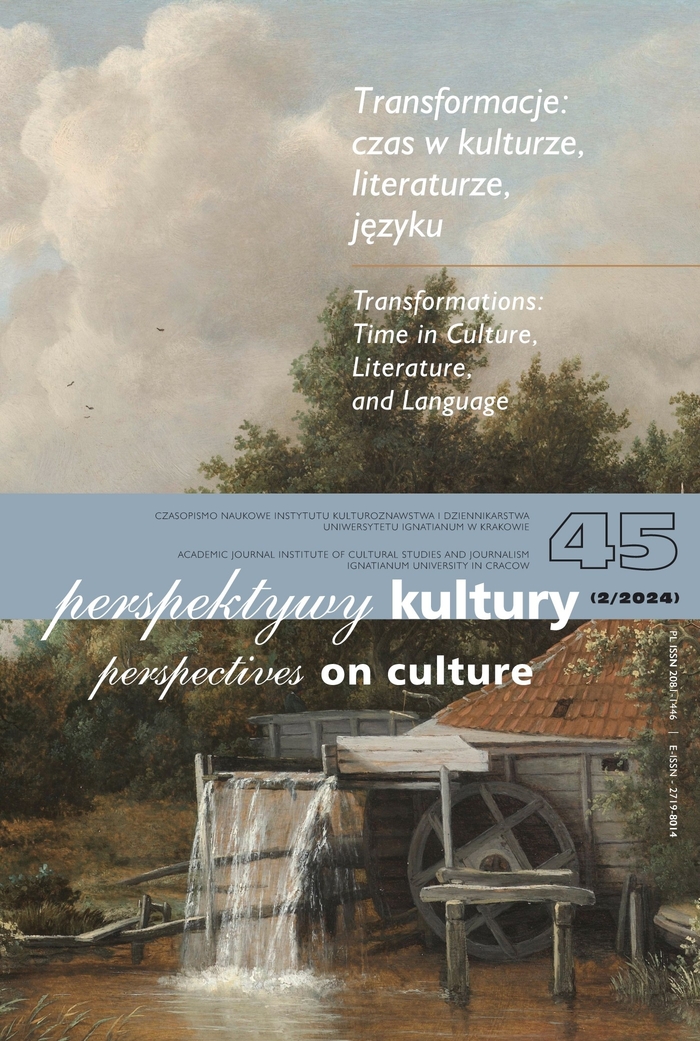Time and Transformation in Henry James’ Social Novels
Abstract
The Princess Casamassima and The Bostonians, both published in 1886, are exceptional in James’ literary career. They exemplify his attempt to adjust to the expectations of his readers by venturing into contemporaneous sociopolitical debates. Writing these two novels was in itself an act of courage. No reviewer expected James to have any expertise in matters relating to the lives of early feminists or lower classes. He was, however, interested in these current issues and invested time and effort in researching them. The two novels form a transatlantic diptych, with The Bostonians addressing the topic of American feminism and The Princess Casamassima focusing on workers’ movements in Britain. Quite predictably, most American reviewers were critical of The Bostonians, which only shows that the novel touched a nerve, and praised The Princess Casamassima, which seemed to concern British society. Reviewers in Britain did the reverse, which exposes the quasi-patriotic impulse in literary reviewing of that time, or perhaps any time. The author argues that James’ work on his social novels transformed his self-perception as a writer. She also shows that the transformations James captured in Anglo-Saxon societies and their representatives on both sides of the Atlantic are at once caught up in history and symptomatically timeless, almost historiosophic.
References
“A Mistake to Understand” (1887, February 23). The Princess Casamassima by Henry James reviewed in the Guardian. Retrieved September 15, 2023, from https://www.theguardian.com/books/2003/jun/28/fromthearchives.henryjames.
Anesko, M. (1986). “Friction with the Market”: Henry James and the Profession of Authorship. Oxford: Oxford University Press.
Davis, B., ed. (2014 [2010]). Martin Heidegger: Key Concepts. Abingdon, Oxon and New York, NY: Routledge.
Edel, L. (1962). The Middle Years. J.B. Lippincott Company: Philadelphia and New York.
Gale, R.L. (1989). A Henry James Encyclopedia. New York: Greenwood Press.
Guy, J.M. (1996). The Victorian Social-Problem Novel: The Market, the Individual, and Communal Life. Houndsmills and London: Macmillan.
James, H. (1984). The Letters of Henry James, Volume IV: 1895-1916. Edel, L. (ed.). Cambridge MA: Harvard University Press.
James, H. (1987). The Complete Notebooks of Henry James. Edel, L. and Powers, L. (eds.). New York and Oxford: Oxford University Press.
James, H. (2011a [1913]). A Small Boy and Others: A Critical Edition. Collister, P. (ed.). Charlottesville & London: University of Virginia Press.
James, H. (2011b [1934]) The Art of the Novel: Critical Prefaces. Blackmur, R.P. (Introduction), Tóibín, C. (Foreword). Chicago: University of Chicago Press.
James, H. (2020). The Princess Casamassima. Poole, A. (ed.). Cambridge: Cambridge University Press.
Joyce, S. (2015). Modernism and Naturalism in British and Irish Fiction, 1880-1930. Cambridge: Cambridge University Press.
Karlin, D. (2019). Introduction. In The Bostonians. Karlin, D. (ed.) (pp. xxvii–cxiv). Cambridge: Cambridge University Press.
Merriam-Webster. (n.d.). Tergiversation. In Merriam-Webster.com dictionary. Retrieved September 13, 2023, from https://www.merriam-webster.com/dictionary/tergiversation.
Okker, P. (2003). Social Stories: The Magazine Novel in Nineteenth-Century America. Charlottesville and London: University of Virginia Press.
Poe, E.A. (2023 [1846]). “The Philosophy of Composition.” In The Norton Anthology of American Literature. Levine, R.S. (general ed.) (pp. 714–722). New York: W.W. Norton & Company.
Poole, A. (2020). Introduction. In The Princess Casamassima. Poole A. (ed.) (pp. xxv– xcv). Cambridge: Cambridge University Press.
Ronda, B.A. (2017). The Fate of Transcendentalism: Secularity, Materiality, and Human Flourishing. Athens, GA: University of Georgia Press.
Small, R. (2010). Time and Becoming in Nietzsche’s Thought. London and New York: Continuum.
Wadsworth, S. (2022). Introduction. In The Complete Letters of Henry James, 1887–1888, Volume 1. Anesko, M, Zacharias, G.W., Sommer, K. (eds.) (pp. xix - lxvi). Lincoln NE: University of Nebraska Press.
Copyright (c) 2024 Perspectives on Culture

This work is licensed under a Creative Commons Attribution-NoDerivatives 4.0 International License.
Autor, zgłaszając swój artykuł, wyraża zgodę na korzystanie przez Wydawnictwo Uniwersystet Ignatianum z utworu na następujących polach eksploatacji:
- utrwalania utworu w formie papierowej, a także na nośniku cyfrowym lub magnetycznym;
- zwielokrotnienia utworu dowolną techniką, bez ograniczenia ilości wydań i liczby egzemplarzy;
- rozpowszechniania utworu i jego zwielokrotnionych egzemplarzy na jakimkolwiek nośniku, w tym wprowadzenia do obrotu, sprzedaży, użyczenia, najmu;
- wprowadzenia utworu do pamięci komputera;
- rozpowszechniania utworu w sieciach informatycznych, w tym w sieci Internet;
- publicznego wykonania, wystawienia, wyświetlenia, odtworzenia oraz nadawania i reemitowania, a także publicznego udostępniania utworu w taki sposób, aby każdy mógł mieć do niego dostęp w miejscu i czasie przez siebie wybranym.
Wydawca zobowiązuje się szanować osobiste prawa autorskie do utworu.





